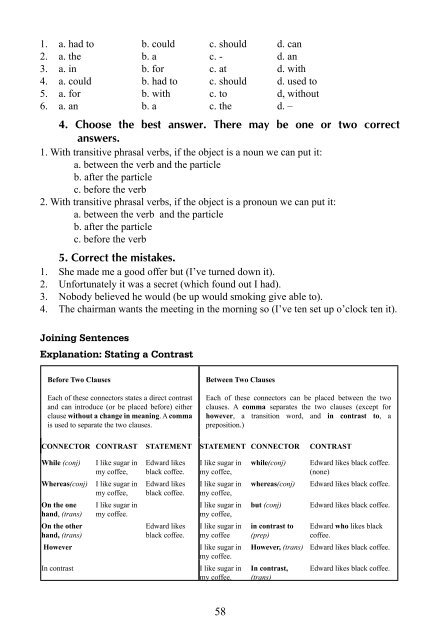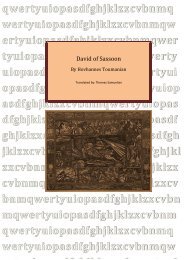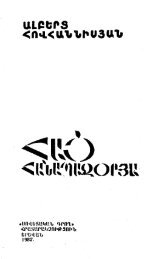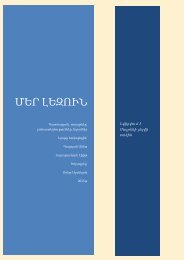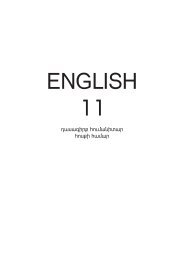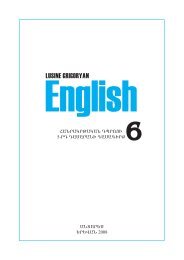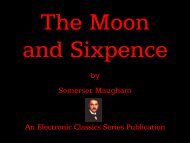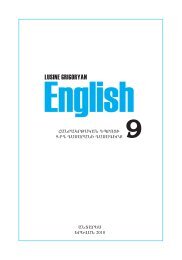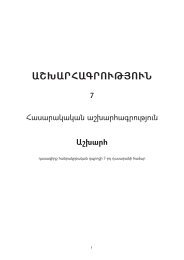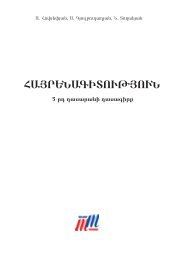Focus on Words
Focus on Words
Focus on Words
Create successful ePaper yourself
Turn your PDF publications into a flip-book with our unique Google optimized e-Paper software.
1. a. had to b. could c. should d. can<br />
2. a. the b. a c. - d. an<br />
3. a. in b. for c. at d. with<br />
4. a. could b. had to c. should d. used to<br />
5. a. for b. with c. to d, without<br />
6. a. an b. a c. the d. –<br />
4. Choose the best answer. There may be <strong>on</strong>e or two correct<br />
answers.<br />
1. With transitive phrasal verbs, if the object is a noun we can put it:<br />
a. between the verb and the particle<br />
b. after the particle<br />
c. before the verb<br />
2. With transitive phrasal verbs, if the object is a pr<strong>on</strong>oun we can put it:<br />
a. between the verb and the particle<br />
b. after the particle<br />
c. before the verb<br />
5. Correct the mistakes.<br />
1. She made me a good offer but (I’ve turned down it).<br />
2. Unfortunately it was a secret (which found out I had).<br />
3. Nobody believed he would (be up would smoking give able to).<br />
4. The chairman wants the meeting in the morning so (I’ve ten set up o’clock ten it).<br />
Joining Sentences<br />
Explanati<strong>on</strong>: Stating a C<strong>on</strong>trast<br />
Before Two Clauses<br />
Each of these c<strong>on</strong>nectors states a direct c<strong>on</strong>trast<br />
and can introduce (or be placed before) either<br />
clause without a change in meaning. A comma<br />
is used to separate the two clauses.<br />
Between Two Clauses<br />
Each of these c<strong>on</strong>nectors can be placed between the two<br />
clauses. A comma separates the two clauses (except for<br />
however, a transiti<strong>on</strong> word, and in c<strong>on</strong>trast to, a<br />
prepositi<strong>on</strong>.)<br />
CONNECTOR CONTRAST STATEMENT STATEMENT CONNECTOR CONTRAST<br />
While (c<strong>on</strong>j)<br />
Whereas(c<strong>on</strong>j)<br />
On the <strong>on</strong>e<br />
hand, (trans)<br />
On the other<br />
hand, (trans)<br />
I like sugar in<br />
my coffee,<br />
I like sugar in<br />
my coffee,<br />
I like sugar in<br />
my coffee.<br />
Edward likes<br />
black coffee.<br />
Edward likes<br />
black coffee.<br />
Edward likes<br />
black coffee.<br />
I like sugar in<br />
my coffee,<br />
I like sugar in<br />
my coffee,<br />
I like sugar in<br />
my coffee,<br />
I like sugar in<br />
my coffee<br />
However I like sugar in<br />
my coffee.<br />
In c<strong>on</strong>trast<br />
I like sugar in<br />
my coffee.<br />
while(c<strong>on</strong>j)<br />
whereas(c<strong>on</strong>j)<br />
but (c<strong>on</strong>j)<br />
in c<strong>on</strong>trast to<br />
(prep)<br />
However, (trans)<br />
In c<strong>on</strong>trast,<br />
(trans)<br />
Edward likes black coffee.<br />
(n<strong>on</strong>e)<br />
Edward likes black coffee.<br />
Edward likes black coffee.<br />
Edward who likes black<br />
coffee.<br />
Edward likes black coffee.<br />
Edward likes black coffee.<br />
58


